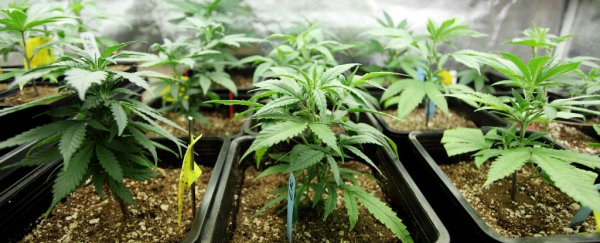The largest ever longitudinal twin study involving more than 3,000 adolescents from around the world has found little evidence to suggest that adolescent marijuana use has a direct effect on intellectual decline.
The study analysed the results of two separate studies that traced the lives of American adolescent twins over a decade, and both found that teens who engaged in regular marijuana use lost no more IQ points over time than their non-using twin siblings.
The perceived link between dwindling intelligence and marijuana use can most recently be traced to a 2012 study by Duke University researchers, who concluded that frequent and heavy marijuana use is likely associated with a decline in IQ.
But a follow-up study - also published in the Proceedings of the National Academy of Sciences - revealed that many confounding factors that have also been linked to IQ decline, such as cigarette and alcohol use, low socio-econimc status, and mental illness, were never accounted for.
"Although it would be too strong to say that the results have been discredited, the methodology is flawed and the causal inference drawn from the results premature," lead author of the follow-up study, Ole Rogeber from the Ragnar Frisch Centre for Economic Research in Norway, concluded.
So despite the commonly held belief that smoking pot makes you stupid, we really haven't seen much concrete evidence to back the claim up. And now researchers from a number of universities across the US have analysed the findings of two previous reports that investigated the relationship between marijuana use and intelligence decline in twins, and found no measurable link either.
One report, known as the the Risk Factors for Antisocial Behaviour (RFAB) study from Southern California, measured the IQ of 789 twins aged of 9-10 years in 2001, then tested them again on five separate occasions over the course of the next 10 years. The Minnesota Twin Family Study (MTFS) traced 2,277 teenaged twins, testing them once in 1990-1996 when they were 9 -11 years old, and again in 1999-2006.
The teenagers had their IQs tested, their vocabularies and general knowledge measured, and were asked to fill out confidential surveys about their marijuana use and instances of binge drinking, and the use of other drugs, such as opioid painkillers and cocaine.
"We also examined a subset of discordant twin pairs in which one sibling had never used marijuana before and the cotwin had frequently used marijuana (i.e., greater than 30 lifetime uses and/or a period of daily use)," the researchers report in Proceedings of the National Academy of Sciences.
According to Emily Underwood at Science, marijuana users lost about four IQ points over the course of the study, but their twin siblings that weren't using marijuana experienced a similar pattern of decline, which suggests that some other factor was at play.
"Our findings lead us to believe that this 'something else' is related to something about the shared environment of the twins, which would include home, school, and peers," statistician and lead author, Nicholas Jackson from the University of Southern California in Los Angeles, told her.
The researchers did find that marijuana users fared more poorly than abstainers in tests of vocabulary and general knowledge, but could not find any link to usage frequency and amount, which again suggested that something else was at play.
"If smoking pot harmed test scores, the researchers reasoned, people who'd smoked more pot should show poorer trends than those who'd smoked less," the Associated Press reports. "But that's not what the data revealed. Among users, those who'd smoked more than 30 times or used it daily for more than a six-month stretch didn't do worse."
Jackson and his team suspect that what could be going on is that kids who are doing badly in school, or declining in performance, could be more likely to give marijuana a try. "[C]hildren who are predisposed to intellectual stagnation in middle school are on a trajectory for future marijuana use," the study says.
The study does have its limitations - the facts that the teens were asked to self-report their marijuana use and IQ score doesn't necessarily equal intelligence should not be considered lightly. But it does make a convincing case that in lieu of any actual evidence that the chemicals in marijuana are somehow actively causing a decline in intelligence, future research should look into possible factors that could make a teenager more likely to use the drug, and what real effects it could be having, on things other than intelligence.
"We desperately need more research on the effects that marijuana has on the brain," Jackson told Science.
